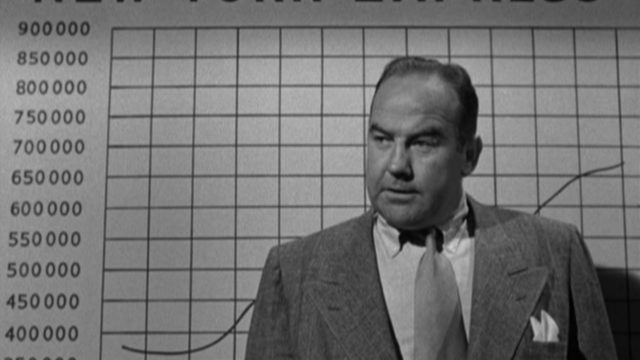Scandal Sheet is a tight little crime melodrama set in the world of tabloid journalism. It is also a surprisingly moving tragedy about what happens when doing your job well dissolves a close mentor/protégé relationship. Its dramatic core reveals what happens when the code of conduct for “getting the story” confronts the bonds of male professional affection.
The picture begins with an establishing shot of the majestic skyscrapers of the New York City skyline dissolving into to the squalid tenements of Hell’s Kitchen, where Steve McCleary (John Darek) impersonates a police officer in order to get an exclusive eyewitness interview with the sister of an ax murder victim. Throughout the picture, he suppresses evidence from the police, bribes government officials with prime baseball tickets, and cuts phone wires to keep the competition from beating his paper, the New York Express, to big scoops. All of these underhanded methods he learns, prior to the picture’s start, from his editor, Mark Chapman (Broderick Crawford), who angers the tabloid’s owner and shareholders with his populist coverage of lurid murder yarns and tales of romantic woe. As he points out at a shareholders’ meeting where the board is prepared to fire him, the public’s appetite for “thrills, excitement and news” is pushing circulation to all-time heights, which translates into higher stock dividends. The content of a great city’s newspaper, he argues, depends on what stories drive the bottom line. With his bonus for pushing circulation over 750,000, Chapman plans to buy the paper and promote his protégé McCleary to editor.
Like Willie Stark, the Southern demagogue who Crawford played several years earlier in All the King’s Men, Chapman actually holds his readers in contempt, comparing them to “drunks who live on hopes and dreams,” which isn’t an inaccurate description: Bowery bars, stocked with the most desiccated faces this side of a Sergio Leone Western, are frequent settings where the reporters make their rounds. Desperation and sadness constitute the rage driving scandal-rag sensationalism, and the writer and editor take pride in their talent for riling up the misery that drives their paper’s success.
McCleary and Chapman frequently clash with the tabloid’s lonely hearts columnist Julie Allison (Donna Reed), whose loathing of the sob sister stories she writes pushes her to the brink of resignation. As her columns suggest, she has a soft heart, and hires out a whiskey-soaked ex-reporter Charley Barnes (Henry O’Neill) as a stringer for her columns. In order to provide fodder for the sentimentalists who read Julie’s prose, Chapman sponsors a “Lonely Hearts” dance for the city’s losers in love, offering household appliances for the first couples who find true romance on the ballroom floor. This proves to be a fatal mistake, as Chapman is confronted there by his wife, Charlotte Grant (Rosemary deCamp), who he deserted back when he lived under another name. When she threatens to expose his past deeds, he strikes her, accidentally fracturing her skull. After staging the death as an accident, Chapman searches for her pawned suitcase, which might contain evidence of his previous identity. The man who boasts of exposing the truth is thus in danger of being the subject of a tabloid scandal.
McCleary arrives at the scene before the police and immediately suspects a setup. Noticing a pin linking to Charlotte’s attendance at the ball on a dress hanging in her closet, he starts researching a story. Barnes also gets in on the act, getting the drop on Chapman, but as he tries to sell the story to a rival paper, the killer strikes again. Allison and McCleary then collaborate on the murder story, but as fate would have it, their aptitude will only reveal their editor’s true nature, thus initiating a tragedy that pushes the Express’s sales numbers into the stratosphere, but exacting a mournful cost.
Scandal Sheet is based on Samuel Fuller’s book The Dark Page, the last novel he completed before enlisting in the First Infantry division during WWII. It won a major trade paperback industry award in 1943, and Howard Hawks bought the option on the book. He hired the soon-to-be-cult director to write the screenplay, and soon put him on assignment to adapt Ernest Hemingway’s The Sun Also Rises. Neither properties were made under Hawk’s supervision. Hawks sold the rights to The Dark Page to Columbia, who commissioned a drastic rewrite from Ted Sherdeman, Eugene Ling, and James Poe, with Phil Karlson to helm. Fuller expressed disappointment with the subsequent adaptation, which he felt weakened the tragic thrust of the story by eliminating scenes involving the editor’s tutelage of the reporter during the early days of his career.
Had either Hawks or Fuller directed it, no doubt Scandal Sheet would have a more elevated reputation. It lacks the sense of community and rom/com undercurrents that define the former’s works, and the long takes and eccentric close-ups that define the latter’s reputation. Fuller’s critique seems harsh, however, particularly for viewers who are unfamiliar with the source. The screenplay retains enough of the proverbial “tricks of the trade” to convey a sense of the atmosphere of the tabloid world and the feeling that both McCleary and Chapman are assholes awaiting their eventual comeuppance. Crawford’s work here is in keeping with the gravitas of his Oscar-winning performance from several years before, lending the character’s fall a grandeur that compensates for the compressions made to the novel’s outline. What Karlson’s direction lacks in authorial personality it makes up for in pacing and momentum. No scene seems inconsequential, and each moment is punctuated with tart, hard-boiled dialogue. In the end, Scandal Sheet is a modest but effective crime picture of its period, tersely conveying the pragmatic, cut-to-the-chase virtues of the tabloid sensibility in which the tale is set.

